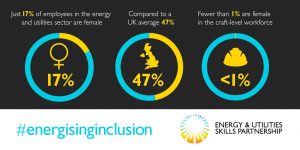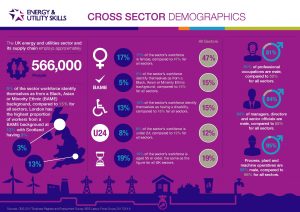The latest report shows that female employment rates in the UK have hit a record high at 71.6%, up 0.6 percentage points on the year, leaving a record low of 3.7% unemployed.
In the search for diversity of thinking, high performance and new talent, utility employers explicitly recognise that pursuing gender balance will lead to high performance business. But the business case has previously been informed by labour market intelligence advising that as over half of the nations 67 million population is now female, UK employers are missing out on 34 million domiciled talent opportunities. The latest ONS statistics help to show the reality of the labour market situation, and give a clearer focus as to where employers are most likely to find the talent necessary to bring sustainability to their gender profile.
In the past 40 years, the UK has seen an almost continual rise in the proportion of females in employment, but the available market falls some way short of offering the vast numbers indicated by previous labour intelligence briefings. Currently, an estimated fifteen and a half million females work, and of these approximately 9 million are available to work full time and 6.5 million part time. As indicated by the ONS, the available female unemployed are at a record low since records began.
The growth in female employment is judged as largely resulting from:
- Changes to pension age: Previously women could retire at 60, whilst men retired at 65. In 2007, legislation changes indicated a move to ensure that both men and women will eventually retire at the same age. Further changes accelerated the policy in 2011 and the retirement age will be 66 by 2020 and 68 between 2024 and 2046
- A far greater number of women in employment from mid-to-late 20s and early 30s; data indicates that women are less likely to drop out of the labour market around the time they have their first child, and stay in paid work through the years following
The most common sectors of employment for women are now health and social work, which accounts for over 20% of all jobs held by women (as of September 2018). Wholesale and retail (14%) and education (12%) follow. A significant 79% of jobs in the health and social work sector and 70% of jobs in the education sector are now held by women.
Nick Ellins, Chief Executive of Energy & Utility Skills commented:
“The latest statistics from the ONS help the UK utility sector to better understand the size of the female labour market that they can genuinely engage with, adding welcome clarity as to where collaborations underway through the Energy & Utilities Skills Partnership can have most impact. In essence, the ONS are showing us that employers will be primarily competing against each other if they wish to secure a greater proportion of female workforce. That will directly impact employment costs and productivity. If this is how the talent battle emerges, we can compete, and through the sector’s Talent Source Network mass attraction initiative, employers have already proven that where the social value and purpose is clear, millions of people will look at utilities for their future career. Over 50% of those doing so are currently female. But we also have to get slicker at securing a better share of those entering the labour market for the first time, and with around 6 out of every 10 students in higher education being female, and 6 out of 10 of those graduating with a masters or equivalent being female, the business case is self-evident. The quest to protect and enhance our human capital must be tackled as one by the whole environmental infrastructure sector, through one coordinated effort by policy makers, regulators, unions, regulated companies, the vital supply chain and key interest groups.
References
- Institute of Fiscal Studies: The rise and rise of women’s employment in the UK https://www.ifs.org.uk/uploads/BN234.pdf
- House of Commons Library Briefing Paper: Women and the Economy https://researchbriefings.files.parliament.uk/documents/SN06838/SN06838.pdf
How the Energy & Utilities Skills Partnership is making a difference
The Energy & Utilities Skills Partnership is a collective of leading sector employers who are working together to “ensure a safe, skilled and sustainable workforce provides the essential services that our customers seek and meets the UK’s needs from the energy and utilities infrastructure.”
Established in 2016, the Skills Partnership has acted to address sector workforce needs, most notably with the inaugural Workforce Renewal & Skills Strategy, launched in February 2017. The Skills Strategy was the first-ever sector-wide strategic plan for the continued delivery of clean water, waste removal, power and gas to consumers and businesses across the UK.
The Skills Partnership launched the sector’s Inclusion Commitment in February 2019, and has committed to ensuring the Energy and Utilities sector workforce is an inclusive and diverse one:
- Being inclusive enables our sector to attract and retain the diverse talent that is crucial to ensuring a resilient workforce.
- Being inclusive will help us to be more innovative and achieve greater productivity by adapting to our changing environment.
- Having a diverse workforce ensures we are reflective and inclusive of the customers and communities we serve.
Inclusion in Action – Talent Source Network
The sector is already collaborating to ensure our industries have a sufficient pipeline of diverse talent entering the sector, whilst retaining quality candidates for the future. Talent Source Network is a collaboration of 25 leading organisations that is tasked with supporting identified sector needs.
Talent Source Network connects employers, talent and partners. While also focusing on delivering targeted campaigns on sector attraction, recruitment and talent retention with youth entrants, Apprentices, Graduates, redeployed professionals and service leavers. There is a focus on reaching some our underrepresented demographics including women, BAME and people with disabilities so the opportunities our sector has to offer are more visible to all.
The Network is unique within the sector and specifically designed by and for our members for their needs.
Using the strength of our collective brands and values: Talent Source Network allows us to showcase the sector; our people, our opportunities and careers to talent from all backgrounds.
Resources
Please click on the images below to enlarge.
- Learn more about the Sector’s Inclusion Commitment
- Read our White Paper – Is Enough Value Placed on Human Capital to Deliver Vital Infrastructure?

